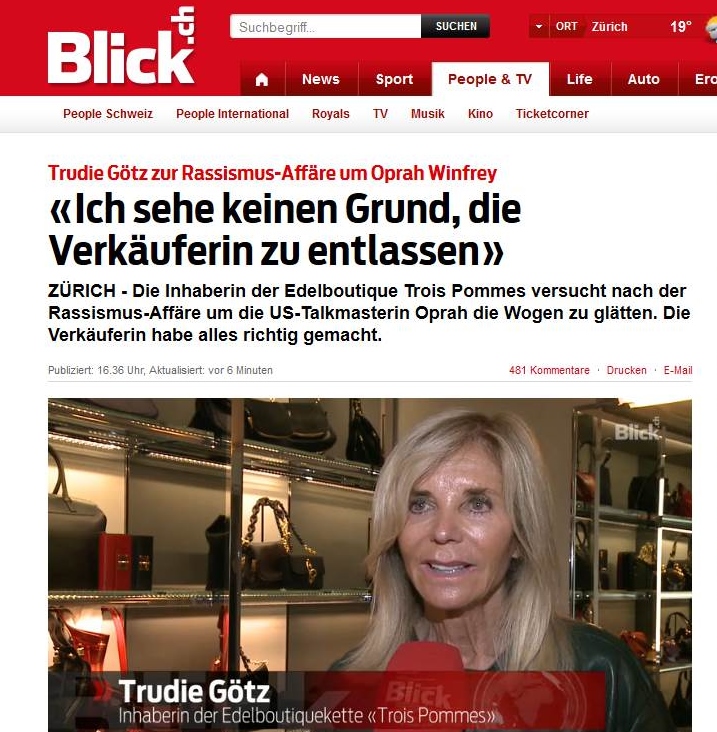In my blog post of August 9, I commented on the Oprah incident in Zurich which has been dubbed Täschligate (handbag-gate) in Switzerland. While “Oprah-Gate” has long been dropped from short-lived news cycles around the world, the story continues to unfold in Switzerland. And here the story becomes interesting: how does a small country process the scolding and humiliation by the global media?
Here is a brief synopsis: Oprah entered an exclusive Zurich boutique, asked to see a very expensive handbag, but being turned down by the sales clerk with the remark that this item would be too expensive for her. This at least is Oprah’s version of the story. The story was picked up by news outlets around the world after Oprah’s high-profile interviews with Entertainment Tonight and with Larry King, and Oprah’s interpretation of this incident as racially motivated was uncritically accepted and disseminated. In my first blog post, I concurred that there was a racial component to the story, and in spite of some unresolved discrepancies I have not changed my mind.
There have been multiple responses in Switzerland, and the bulk of them focused on discrediting Oprah on some level and thus on putting her credibility in question. One commentator bluntly claimed that she couldn’t sing nor act and that her only true skill was self-presentation. The most common response is to frame Oprah as a petulant and narcissistic star who was irritated by the fact that she was not recognized in an upscale boutique–which is used to dealing with celebrities–and that her show does not have any traction in Switzerland.
First, there was a tearjerker of an interview in the Swiss tabloid Blick with the sales clerk–who was idendified as Adriana N.–with the title “I have not been able to sleep for days!” It is a full-blown victim narrative–“I feel like I am in the center of a hurricane.” Adriana remembers that Oprah entered the store accompanied by a man (Oprah claims to have gone shopping alone). In Adriana’s version of the story, she showed Oprah a handbag from the Jennifer Aniston line and explained that they existed in different sizes and materials. In Adriana’s account, Oprah eyed the expensive crocodile skin bag on top of the shelf: “I told her that this is the same bag like the one I was holding in my hand at the time. Only that that one was much more expensive. I would be happy to show her other bags.” The uncontested fact is that Adriana did not take down the expensive bag even though Oprah showed an interest in it and that Adriana tried to steer Oprah towards less expensive bags.
Trudie Götz, the owner of the boutique, in her own interview with Blick, admits that Adriana committed one mistake by not having taken the bag off the shelf and handed it to Oprah. When Adriana mentioned the price to Oprah, she felt bad about it, according to Götz. Why would you feel bad about stating a price in an upscale shop–unless of course you believed that the item was way out of the person’s price range. So Oprah’s reaction seems justified: she indeed was profiled by Adriana and considered not worthy of being shown this very expensive bag. Was racism a factor? Götz, flatly denied that, adding: “I am sorry, but perhaps she [Oprah] is a bit too sensitive in this regard.” Götz unwittingly points to the inverse as the real problem: if you are white, you don’t have to concern yourself with issues of race.
This is the mainstream interpretation of this event in Switzerland. Even the speedy apology to Oprah by Switzerland Tourism, Switzerland’s heavily subsidized tourism office, now is being criticized in Switzerland. Rino Büchel, a member of parliament representing the populist-right Swiss People’s Party (SVP), is demanding to know how this “bizarre apology” came about. Even Daniela Bär, the spokesperson for Switzerland Tourism who had tweeted the apology, is now backpedaling, stating that the apology was premature, too emotional and provided an unfortunate interpretation of the event. Büchel in the meantime increased the pressure by promising a parliamentary investigation of Switzerland Tourism’s original apology, stressing that too many outside of Switzerland were confounding Switzerland Tourism with the country itself and read this as a national admission of guilt. Unfortunately, the headline in Britain’s The Telegraph bears this out: “Switzerland apologises to Oprah Winfrey over handbag incident.” And Politico reported: “The Swiss government and the boutique apologized, trying to tamp down what had a become a worldwide story.”
One of the more bizarre commentaries by Martin Sturzenegger in the Zurich daily Tages-Anzeiger focuses on the object of desire: the handbag, made from crocodile skin and with a SFr. 35,000 ($38,000) price tag. For this handbag, the skins of three crocodiles were used who were raised under horrible conditions in a crocodile farm, as the linked PETA video narrated by actor Joaquin Phoenix graphically shows. Sturzenegger points out that PETA, the animal rights organization, named Oprah the person of the year in 2008 because she made her large audience aware of the systemic abuse of animals in industrial settings. Based on the handbag incident, Heinz Lienhard, the president of the Swiss animal rights organization, declared that Oprah was not a true protector of animals. So Sturzenegger’s take is that Oprah is a phony animal lover with a pathological desire for publicity. The problem with this argument: Oprah just wanted to see the bag; she never expressed the desire to buy it.
The most recent line of argumentation in the Tages_Anzeiger and in Blick is that Oprah created a big stir around this incident to promote the new movie “The Butler” in which she has a starring role. Granted, Oprah knows how to generate publicity and how to stage herself. But the article in Politico–on which this theory is based–more generally argues that “Oprah Winfrey is stepping back into politics,” mentioning her discussion of the Zurich incident as one example and only in passing.
All of these responses are typical for a small state that sees itself exposed to massive criticism from abroad. In moments like these, defending national interests trumps introspection and reasoned debate. Even Martine Brunschwig Graf, the president of the federal commission against racism (Eidgenössische Kommission gegen Rassismus), condemned the efforts by mostly foreign media outlets to turn an ego problem into a racism problem, as she put it.
But in the French-speaking part of Switzerland, the response seems to be more moderate. A piece in the Lausanne daily 24 heures, entitled “Oprah Winfrey finds Switzerland racist, and our black community does as well,” takes this opportunity to reflect on racism in Switzerland. Celeste Ugochukwu, the president of the Conseil de la Diaspora africaine de Suisse (CDAS), stated in the article that racial discrimination was common in Switzerland–but more so in the German-speaking part. André Loembe, vice president of a different immigrant organization, diagnosed a rising anti-Black attitude in Switzerland since the early 2000s. The federal commission against racism in a 2010 report confirmed a rise in anti-Black and anti-Muslim incidents. Loembe further expressed his view that Swiss anti-racism laws should be used to prosecute the sales clerk. If you are black in Switzerland, it is a lot easier to see the racial component of Oprah’s handbag incident.
Some progressive politicians take a more critical perspective as well. In an interview with the German news magazine FOCUS, the social democratic politician Andreas Gross recognized a “combination of an inflated self-importance of being Swiss (Selbstüberwertung des Schweizer-Seins) and a strange provincial attitude in contact with foreigners.” In his view, this paradox between competency in foreign trade and inability to deal with foreigners in their own country is poorly understood in Switzerland and not part of a critical self-examination.
The context of increasing hostility towards immigrants in Switzerland also is hard to overlook. Most notable are popular votes against the construction of new minarets in November 2009 and for tightening asylum laws in June 2013. In July, allegations of inhuman treatment of asylum seekers in some Swiss towns became public. In the affluent town of Bremgarten, for instance, asylum seekers have been banned from the public pool and from local sports facilities–this town of 6,500 people has created a total of 32 exclusion zones where asylum seekers are not allowed to go.
So the Oprah incident is just the tip of the iceberg. It reveals a country that feels pressured by immigration and that is deeply troubled by the rapid demographic transformation unleashed by immigration. It also reveals just how clumsy and insecure the Swiss debate about race is. Moreover, it reveals the typical collective small-state defensive reflexes against any perceived threat from the outside that render a national debate toxic. In a more recent interview, Oprah showed a surprising insight into this issue: “It’s not an indictment against the country or even that store. It was just one person who didn’t want to offer me the opportunity to see the bag. So no apologies necessary from the country of Switzerland. If somebody makes a mistake in the United States do we apologize in front of the whole country? No!” The Swiss would do well to take this to heart.

